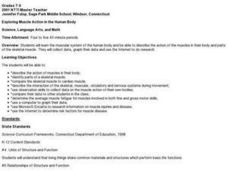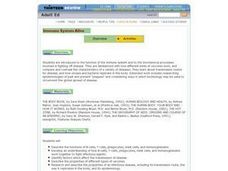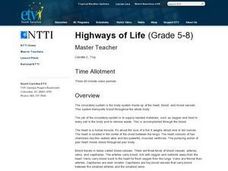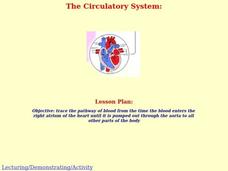Curated OER
The Circulatory System
Students explore the circulatory system of animals. Using the Internet, students research animals without circulatory systems. They identify the three types of blood vessels and describe the flow of blood through the heart. Finally,...
Curated OER
Anatomy
Fourth graders describe how health behaviors affect body systems, and describe the basic function of major body systems.
Curated OER
Exploring Muscle Action in the Human Body
Students collect and graph data and use the internet to research the skeletal muscles.
Curated OER
Your Body's Building Blocks
Students study the elements of the Periodic Table as they relate to the building blocks of the body. They experiment to measure the amount of iron in the body.
Curated OER
The Heart Stopper
Use the pump from a spray bottle to drive a model of the heart in action! In addition to modeling the function of the heart and blood vessels, aspiring anatomists also simulate arterial blockage. They compare the effects of increased...
Curated OER
Hierarchy Theory and Biotic Hierarchy
Learners examine the hierarchy theory and biotic organization by playing a teacher-created card game matching groups of items, such as organelles, in suits of four. They discuss the reasons for their hierarchical organization of the...
Curated OER
TE Activity: Hot or Not
Students examine how the human immune system responds to germs and explain what a fever is. They design a thermometer in order to further explore temperature before completing a temperature conversion worksheet. They detail the work of...
Curated OER
The Human Organism
In this digestion and nutrition lesson, 3rd graders test foods to find their vitamin content. Students test for starch and fats then compare their findings on charts and oral reports. The lesson concludes with a teacher directed...
Curated OER
The Human Heart: An Introduction
Fifth graders view a transparency of the human heart and answer questions based on their observations. They read pages from their textbook and discuss the information presented. They visit a website to view the human heart and create a...
Curated OER
Digestive System, a Kinesthetic Lesson
Students actively act out an aspect of the digestive tract on two parallel strips of tape on the floor 3-4 feet apart and width of classroom which represent the digestive tract.
Curated OER
The Human Organism
Students identify their feelings and learn constructive ways of handling conflict. In this human mental health lesson, students identify their feelings, learn how to tell others about their feelings, and learn how to resolve conflict....
Curated OER
Anatomy
Third graders explore the basic structures and functions of the human body and how they relate to personal health.
Curated OER
Investigate the Role of Cholesterol from Cholesterol-rich Foods in the Human Body
Eighth graders assess fat content of different food samples. For this biology lesson, 8th graders create a flowchart showing the transport of cholesterol in the bloodstream. They perform tests for the presence of lipids on food...
Curated OER
Aerobic Frisbee Golf
Students work cooperatively to accurately throw a Frisbee in order to learn about fitness components and different systems of the human body.
Baylor College
How Much Water Do Humans Need?
Physical or life science learners measure the amounts of water eliminated by intestines and the urinary system, and the amounts lost via respiration and perspiration. In doing so, they discover that the body's water must be replenished...
Curated OER
Perfection on Ice!: Math, Geometry, Fibonacci Numbers, Olympics
Students use the human body as a foundation for gaining practice in measuring angles and calculating ratios and proportions.
Curated OER
Changing Bodies
Seventh graders listen to a poem about how a teen feels not understanding what is happening inside his body. In this health lesson, 7th graders label the endocrine glands and put sex characteristic cards in the order they think they...
Curated OER
BELT-ABOUTS LESSON 2
High schoolers explain why safety belts don't fit all children. They decribe the correct way to wear a safety belt. Students explain why incorrect belt fit can be dangerous. They are shown a diagram of the human body. High schoolers...
Curated OER
Immune System Alive
Students examine the function of the immune system. They read and discuss text, complete a K-W-L chart, sequence photos of white blood cells encountering bacteria, develop an outline, and write an essay.
Curated OER
What Becomes of Cell?
Sixth graders analyze and compare a cell's tissues, organs and organ systems. They watch a video reviewing the body systems and design poster boards showing their functions.
Curated OER
H2O in Us
Students discover through this activity that all organisms are composed of water. They find that 70 percent of their bodies are made up of water that is in thier cells and blood, and not free-flowing throughout their body.
Curated OER
The Skeletal System
Students identify the different parts of the skeletal system. In this biology activity, students put together a skeleton using an interactive website. They evaluate the accuracy of their own answers.
Curated OER
Highways of Life
Young scholars explore the circulatory system. They participate in media activities to explore blood flow and identify the parts of the circulatory sytem. Students create a model of the circulatory system.
Curated OER
The Circulatory System
Students follow the path of blood from its entrance into the right atrium of the heart until it leave through the aorta to the rest of the body. They study the heart's structure and how it pumps blood using the included activities. They...
Other popular searches
- Human Body Anatomy
- Human Body Anatomy Sketching
- Human Body Anatomy Diagrams
- Human Biology and Anatomy
- Human Body Anatomy Muscles
- Human Body Anatomy Game
- Human Brain Anatomy
- Human Body Anatomy Brain
- Human Body Anatomy Bones
- Human Heart Anatomy
- Human Body Anatomy Hearing
- Human Body Anatomy Veins























